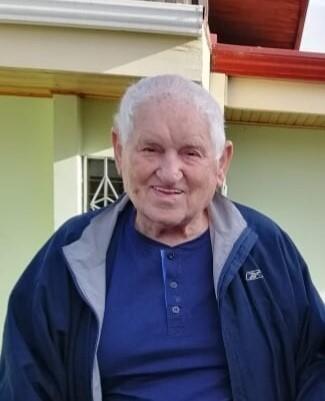Daniel Comboni
Comboni Missionaries
Institutional area
Other links
Newsletter
In Pace Christi
Piccinelli Giacomo
It is beautiful to contemplate the tall trees of the forest outlined against the immense heavens. Their presence encourages us and urges us to commit ourselves. The fall of any one of these giants makes a great noise and leaves a gap in the horizon. This is what I felt when, last January, I saw Fr. Giacomo Piccinelli in a wheelchair, sorely tried physically but always cheerful, smiling and a ready wit.
Fr. Giacomo was born at Brinzio, in Lombardy (Italy), on 9 June 1928. He grew up amongst dynamic and productive people, in a blessed land, irrigated by the waters of Lake Como and the snow-covered peaks of the Alps. His parents, seeing his abilities, wanted him to become a teacher but God’s plans were different. For the restless Giacomo, the environment of the lake and the classroom was too confined: following the call of God, he knocked on the door of the Combonis and they accepted him. Giacomo was ordained priest on 31 May 1958. He didn’t have to wait long to leave for the mission as, in 1961, he was appointed to South Lower California, in Mexico.
I met him some years later to ask him if he would agree to change community. The province was asking him to leave the mission for the capital where he would have had to devote himself to a group of young people who, under the patronage of the Legion of Mary, needed a priest for their human and Christian formation. For Fr. Giacomo, this meant leaving the mission to which he had dedicated all his energy and hopes. It cost him dearly but he agreed and, for a number of years, worked with those marginalised young people. With his strength of character and confidence in God, he succeeded in being accepted by them. Like a good father, he taught them to be honest and productive, to earn their daily bread by working honestly and respecting others. The young people believed in him since he was the first to roll up his sleeves and they cried when the superiors asked Fr. Giacomo to move to the mission the Combonis had opened among the indigenous people of Tuxtepec and the surrounding area, in the diocese of Oaxaca.
In the seventies, due partly to the insistence of certain people, the General Administration authorised a missionary commitment among the indigenous people of Chinantla. Fr. Giacomo asked to be included in the list of the lucky ones who were going to support the Christian communities there. Appointed to Ojitlán, he soon became aware of the religiously desolate situation. During a patronal feast, he had an opportunity to see that Jesus Christ and the Word of God were entirely absent from those feasts! Besides, the parish of Ojitlán had become a fiefdom of the Lefebvre traditionalists. Fr. Giacomo immediately understood that condemnation would not have helped and ruled that all religious celebrations should be preceded and accompanied by the proclamation of the Word of God. It was not easy but it succeeded in some villages. The superiors, however, in the aftermath of certain events, thought it best not to accentuate the differences that existed between the various groups and asked Fr. Giacomo to leave that turbulent one and go to Costa Rica, to minister to the lay faithful of the Vicariate of Puerto Limón. There he began to form small Christian communities assembled by the Word of God, sustained by the Eucharist and energised by the missionary mandate of Jesus. Catechetical centres were set up where periodic retreats were held and Fr. Giacomo found a way to express his “charism” as a builder and planner, also demonstrating his capacity for fraternity and friendship with the lay collaborators; many people came to God and remained faithful to the Church. Fr. Giacomo’s personality was complex: he was not only a builder and a missionary but also a great admirer and disciple of St Benedict and his motto “ora et labora”. “If you are not willing to do manual work, you will not eat”: he never spoke these words but they were written on his face. He was a blacksmith, a carpenter, a cook and took care of the hens and the rabbits. He had succeeded completely in carrying out this life programme in El Salvador when the superiors transferred him from Bribrí, Costa Rica, and sent him to Cuscatacingo, a peripheral parish which still bore the wounds of the recent civil war the bloody clashes between gangs. In a few years, the parish had changed and the Combonis offered it to the bishop in exchange for permission to start a new parish in a needy area in the outskirts.
Giacomo spent the last years of his life in a village on the airport road near San Salvador. Finally, his guardian angel took him from his wheelchair and carried him to his encounter with the Lord of life. The calendar showed it was 11 July 2020.
(Fr. Gianmaria Piu, mccj).

